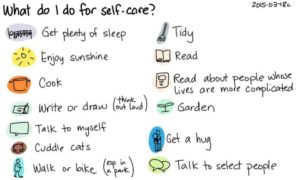I am the accidentally over-polite person who says “thanks” multiple times when placing a Starbucks order. I feel super awkward asking for help and almost never interrupt someone to do so, and I’m extremely thorough in everything I do. However, this means that I don’t always manage my time well, even when I’m working at the Writing Center. This needs to change, not only for my own sanity, but because I owe it to my self, writers, and fellow UCWbLers to manage my work in a timely fashion. If you can relate to my mentality, skim the rest of the post (before it takes up too much of your time) and see if any of these ideas are helpful!
This post was inspired by Erin, The Writing Center director, and her Slack post about keeping appointments on time at the end of winter quarter. Though I rarely ever keep face-to-face appointments waiting past the scheduled start time (though it has probably happened once or twice), I have a bad habit of getting behind on writing appointment letters. I get caught up in keeping track of every little thing mentioned or commented on in an appointment, which prolongs the letter-writing process. However, I am writing this post to motivate myself to take accountability for my actions and fix this bad habit. I don’t think I’m the only person at The UCWbL who struggles with this (at least, I hope not) so hopefully, by concentrating on time management and writing about it, I can pass some of my learning on to others. During my next weeks of appointments, I will try to actively monitor and improve my time management abilities and check in with these tips.
After a very cursory Google search for “time management skills,” I found an article called “8 Tips for Effective Time Management” from Quickbooks Research Center by Lee Polevoi. I used Polevoi’s tips as a jumping-off point; I refined the list to only include the tips that I think are relevant for writing tutors and expanded on the methods and applications of the tips within The UCWbL.
1. Know Your Goals
This tip is pretty self-explanatory because The Writing Center already puts a strong emphasis on goals, both within an appointment and over the course of the school year. Tutors need to address 1-3 agenda items and get through their appointments with enough time to write appointment letters. However, these goals become too flexible if you get into the habit of not actively enforcing them, so they’re important to keep in mind. I often forget to tell writers that our appointment will end early so I can write them an appointment letter—an equally important part of the appointment—even though I know that aligns with our goals and practices. To fix this, I need to think about my goals before conducting an appointment and get back in the habit of making my time constraints clear.
2. Prioritize Wisely
Prioritizing most obviously relates to privileging talking about global concerns over local ones, but it can also apply to other aspects of appointments. I know that when I’m working on written feedback appointments, I tend to get caught up looking for grammar patterns and don’t leave myself enough time to write comments about adding evidence or explaining claims. Additionally, sometimes when I’m trying to catch all of the grammar problems to determine a trend, I miss the point of the writing and have to reevaluate everything I wrote in the last 15 minutes of the appointment. Therefore, as every peer tutor learns in Writing Center Theory and Pedagogy, it’s important to prioritize areas that will have a greater effect on the reader’s understanding, which is often not the writer’s grammar.
3. Just Say No
This is probably the best and most difficult advice on this list. As I mentioned before, I have a hard time both resisting the urge to comment on things I know I don’t have time for and letting an appointment go on too long in order to get through all of an assignment with a writer. Sometimes, just saying no is better for all parties involved so the situation doesn’t continue to escalate. Let’s say I pushed back finishing a written feedback letter to conduct a face-to-face appointment and then let that appointment run long. By the time that appointment is over, I will have delayed the written feedback, the appointment letter of the face-to-face, and my next appointment, and I will have to try to get caught up on everything all at once. Even though it’s hard to say no to these things, saying no is better than your workload piling up and some writers getting less time than others.
4. Plan Ahead
Planning is a great way to effectively utilize time at the Writing Center, but it is not always an option if you have all face-to-face appointments, walk-ins, or writers who don’t upload their online documents early. However, I’ve found that just coming early to look at my scheduled appointments can help me orient myself to how I will spend my time. Maybe I can read the particular requests of some of the writers or save my written feedback documents. Any small action I can do ahead of time will only save me time later, which is especially helpful when I get caught up doing something later.
5. Minimize Distractions
![]() Distractions can be specific and unique to each tutor, but some common distractions many tutors encounter include music, office and outdoor noises, tabs open on your computer, texts, personal worries, the temperature, and lighting. However, if you recognize your individual distractions, you can take preventative measures against them. For instance, I know that when I’m working on a written feedback appointment, I get distracted when I’m too close to a face-to-face appointment. I unintentionally eavesdrop and start focusing on that conversation. However, other tutors might find that conversation to be comforting and ambient background noise. One perk of The Writing Center is that there’s enough room to move around and change aspects of your environment if you find yourself distracted. We have conference rooms, break rooms, and lounge areas where you can move yourself if necessary.
Distractions can be specific and unique to each tutor, but some common distractions many tutors encounter include music, office and outdoor noises, tabs open on your computer, texts, personal worries, the temperature, and lighting. However, if you recognize your individual distractions, you can take preventative measures against them. For instance, I know that when I’m working on a written feedback appointment, I get distracted when I’m too close to a face-to-face appointment. I unintentionally eavesdrop and start focusing on that conversation. However, other tutors might find that conversation to be comforting and ambient background noise. One perk of The Writing Center is that there’s enough room to move around and change aspects of your environment if you find yourself distracted. We have conference rooms, break rooms, and lounge areas where you can move yourself if necessary.
6. Take Care of Yourself
If you’re a busy person, you may have read this rule and—like me—thought it was lame. How are you supposed to take care of yourself when you’re working? I know I sometimes come into work with not enough sleep and food in my system and too much stress. Being overworked and overwhelmed is a downside of college and is not particularly conducive to a job that requires mental focus and energy, such as peer tutoring. Because of this, it’s beneficial for tutors to take some time for self-care and make sure our brains can still function after reading papers for five hours straight. Once again, this will vary among tutors and can range from getting coffee or a snack to chatting with other tutors to taking a lap around the office.
Time management is a skill that is difficult to develop and adhere to consistently and confidently, especially in an environment that has so many changing variables. I struggle with managing my time in multiple aspects of my life and am consciously trying to improve it. However, there are techniques and mindsets that can facilitate time management at The Writing Center and make everyday life a little easier.
I’m always looking to find out more about this topic, so feel free to reach out to me if you have other ideas about this subject. How do you manage your time at The Writing Center?
Discover more from UCWbLing
Subscribe to get the latest posts sent to your email.





